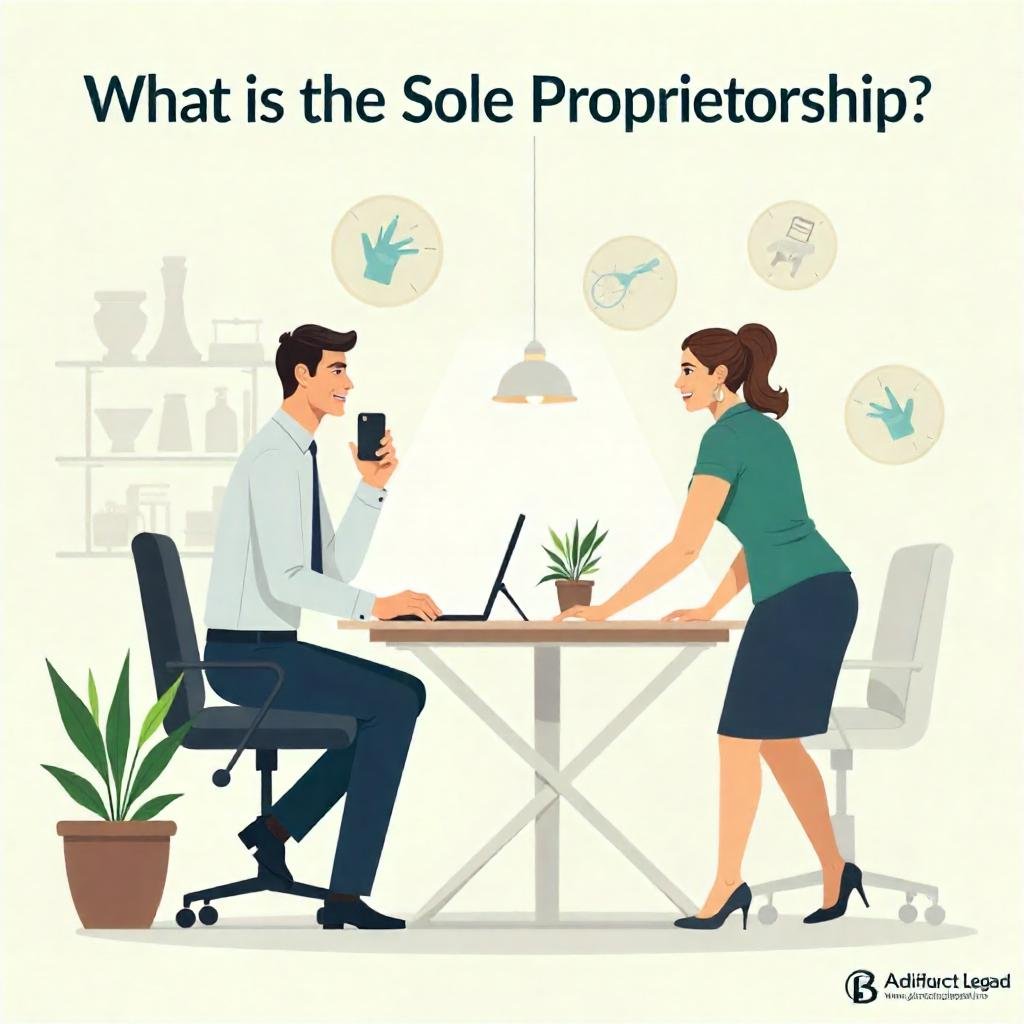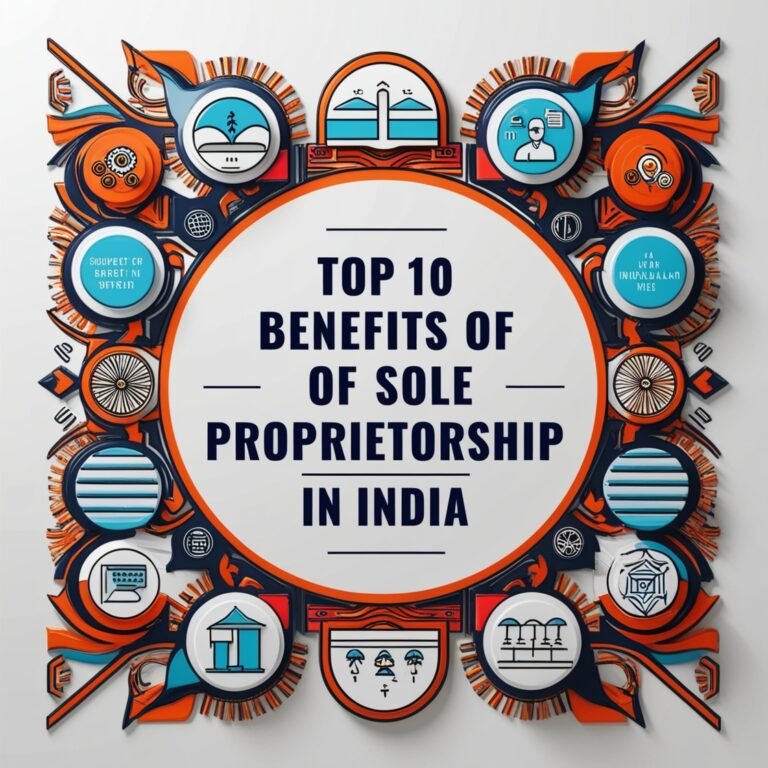In this blog we will explore the Top 10 Benefits of Sole Proprietorship, from low startup costs to tax benefits and more, explaining why it is a desirable choice for many business owners. A sole proprietorship is one of the easiest and most flexible business structures, especially for small businesses and entrepreneurs. Depicting flexibility, prudence, and ease of setup, it allows owners to govern their operations fully.
- What is the Sole Proprietorship?
- What are the Top 10 Benefits of sole Proprietorship in India?
- 1. Personal Liability
- 2. Confidentiality
- 3. Easy to Establish
- 4. Full Control for the Owner
- 5. Lower Operational Costs
- 6. Privacy
- 7. Simple Dissolution Process
- 8. Sole Responsibility for Capital Contributions
- 9. Taxation Benefits
- 10. Flexibility
- Conclusion
- FAQs
- What are examples of sole proprietorship?
- Who is a famous sole proprietorship?
- What is the disadvantage of sole proprietorship?
- What are the 5 characteristics of a sole proprietorship?
- What is the law of sole proprietorship?
- What famous company is a sole proprietorship?
- What is the future of sole proprietorship?
- Can a proprietorship have two owners?
What is the Sole Proprietorship?
A sole proprietorship is a type of business structure that is owned and operated by a single person. It is the simplest and most typical form of business entity especially for small businesses. Here is an overview of its main features.
1. Sole Proprietorship: One person owns administers and controls the business.
2. No legal distinction: The owner and the business are legally considered the same entity, which means personal and business assets are not separated.
3. Highly Liable: The owner is personally liable for all debts and dues of the business. If the business fails or becomes indebted, the owner’s assets may be at risk.
4. Minimal permissions: There are minimal regulatory and legal compliances required compared to other business structures. However, this may vary depending on the business and situation.
5. Taxation: Profits are taxed as personal income to the owner, eliminating the need for a separate corporate tax return.
6. Flexibility and Control: The owner has complete control over all business decisions and operations.

What are the Top 10 Benefits of sole Proprietorship in India?
1. Personal Liability
2. Confidentiality
3. Easy to Establish
4. Full Control for the Owner
5. Lower Operational Costs
6. Privacy
7. Simple Dissolution Process
8. Sole Responsibility for Capital Contributions
9. Taxation Benefits
10. Flexibility
Sole Proprietorship Registration Contact Our Expert Legal Adviser
1. Personal Liability
Personal liability refers to the legal responsibility that a person has for debts liabilities or legal actions taken against a business or entity. In a sole proprietorship the owner has unfettered personal liability for all debts and legal obligations of the business which means there is no legal distinction between the owners personal and business assets.
Example: If a sole proprietor’s bakery becomes defunct and cannot repay the loan the owner’s personal property can be used to repay the loan.
Limiting Personal Liability:
Insurance: Protects against specific risks.
Incorporation: Forming a private limited company or LLP separates personal assets from business liabilities.
2. Confidentiality
Confidentiality is the practice of keeping information private and private with the unambiguous meaning that it is only accessible to authorized individuals or organizations. This idea is important in fields such as law healthcare work and government where sensitive data is often shared and stored. Privacy is essential to building trust protecting privacy and safeguarding sensitive data from unauthorized access or breaches.
1. Access control: This limits who can see or use the information.
2. Non-Disclosure Agreements (NDA): Legal contracts that prevent the sharing of sensitive data.
3. Data Security: Use of encryption secure channels and regular audits to protect information.
3. Easy to Establish
Yes, sole proprietorship is one of the easiest businesses to start. Here are some reasons why it is easy to start.
1. Minimal legal formalities: Generally, you do not need extensive paperwork or complex registrations to start a sole proprietorship. In India, you need only basic licenses or permits depending on the nature of your business (for example, GST registration, if applicable, or a shop and establishment license).
2. Low setup costs: Because there are no major legal fees or requirements, setup costs are relatively low. You can get started with minimal expenses, making it ideal for small businesses or sole-owner operations.
3. Direct Control: As a sole proprietor, you make all the business decisions and do not need to coordinate with partners or a board, making it faster to set up and manage.
4. Quick Registration (if required): For any required registrations, the process is usually simple, often available online, and can be completed within a few days.
4. Full Control for the Owner
In a sole proprietorship, the owner has complete control over all aspects of the business. This means the owner has the sole discretion to make decisions on work assignments, finances, hiring, strategy, and any other matters, without needing approval from partners, the board or shareholders. Here’s how this control works.
1. Independent Decision Making: The owner takes all business ideas without any preference, thereby making quick adjustments possible.
2. Financial independence: The owner keeps all the profits and controls expenses and investments.
3. Operational flexibility: Changes in products, services or strategy can be easily made.
4. Confidentiality: No need to share sensitive business information with partners or investors.
5. Lower Operational Costs
Lower operating costs refer to the low expenses involved in running an operation or organization. These costs typically include day-to-day expenses associated with production, distribution, and administrative functions. Reducing operating costs is a common goal for businesses to improve profitability, increase efficiency, and remain competitive.
1. Refine processes: Simplify workflows and automate tasks to save time.
2. Outsourcing: Assigning non-core functions such as IT or customer service to third-party providers.
3. Reduce overheads: Cut costs like rent and utilities, and consider remote working.
4. Energy efficiency: Use energy-saving appliances and renewable energy.
5. Negotiate deals with suppliers: Ensure better pricing or bulk discounts with suppliers.
6. Privacy
Privacy refers to the ability or condition to keep private information, contacts, or activities hidden or protected from rampant exploration or unauthorized access. In the context of individuals, businesses, and the digital environment, privacy is a fundamental aspect of personal freedom and security.
1. Personal Privacy: Protection of personal details such as name, address and financial information.
2. Digital privacy: Keeping personal data safe online, like browsing history or social media activity.
3. Information privacy: Ensuring that businesses protect customers’ sensitive data.
4. Communications privacy: Protecting private conversations (e.g., phone, email).
5. Workplace privacy: Keeping employee data safe from improper surveillance.
7. Simple Dissolution Process
Dissolving a sole proprietorship is typically an easy process because it does not involve the complexity of corporate structures. Since the business and the owner are legally the same entity, dissolving a sole proprietorship mostly involves shutting down operations, settling debts and notifying relevant authorities. Here is an overview of the general dissolution process.
1. Cease operations: Cease all business activities.
2. Settle debt: Pay off any outstanding liabilities.
3. Notify employees: Notify employees (if any) and provide final payment.
4. Cancel Licenses: Cancel business licenses, permits, and registrations.
5. Close bank accounts: Close any business bank accounts.
8. Sole Responsibility for Capital Contributions
In a sole proprietorship, the sole owner maintains sole responsibility for contributing capital to the business. This means that the business owner is the only person who can contribute capital to finance the business’s operations, whether in the form of money, property, or resources.
1. Sole source of capital: The owner is solely responsible for providing the capital (money, property, etc.) for the operation.
2. Personal financing: The capital comes from the owner’s savings, loans or assets.
3. Unlimited Liability: If the work fails, the owner is personally liable for the work debts, and also puts personal property at risk.
9. Taxation Benefits
The taxation advantages of sole proprietorships are one of its biggest adult benefits, as they simplify the tax progression and often result in lower taxes for small business owners. Here’s an overview of how taxation works for sole proprietors and the benefits it provides.
Overall, the tax benefits of sole proprietorship mainly revolve around simplified tax filing, pass-through taxation, and deductions on business expenses. These benefits make sole proprietorship a highly attractive business structure for small-scale businesses and individuals looking to reduce administrative costs while enjoying tax relief.
10. Flexibility
Flexibility in the direction of a sole proprietorship refers to the ability of the business owner to take discretion and run operations without needing oversight from others. This is one of the major benefits of a sole proprietorship, and it has many facets.
1. Complete control: The owner makes all decisions without the approval of other people.
2. Quick Adaptation: It’s easy to adjust business strategies or operations as needed.
3. Minimal bureaucracy: No complex structure, decisions and changes faster.
4. Set your hours: The owner controls the work schedule and pace of the business.
5. Financial freedom: The owner decides how to use or reinvest the profits.
Conclusion
The benefits of sole proprietorship are particularly relevant to small business owners and solopreneurs who want simplicity and discretion. Easy setup, minimal administrative requirements and low operating costs make it an accessible option for those starting a business. Additionally, the solo professional enjoys complete autonomy over decision-making, allowing for quick response and flexible business management. With taxation benefits, work income is treated as personal income, and solo professionals often find this structure beneficial for tax purposes as well.
FAQs
What are examples of sole proprietorship?
Examples of sole proprietorships include independent photographers, small landscaping companies, freelance writers, and personal trainers.
Who is a famous sole proprietorship?
Well-known companies that began as sole proprietorships include A&W, where J. Willard Marriott began with a root beer stand and eventually founded the Marriott Hotel chain in 1957.
What is the disadvantage of sole proprietorship?
A major disadvantage of a sole proprietorship is unlimited liability. The owner’s personal assets — such as savings, property and vehicles — are at risk if the business incurs debt, since debt collectors can claim these assets to settle outstanding obligations.
What are the 5 characteristics of a sole proprietorship?
The key features of sole proprietorship include simple structure, sole ownership, unlimited liability, full profit retention and minimal formalities.
What is the law of sole proprietorship?
In a sole proprietorship, the business’s income is considered the owner’s personal income. Profits and losses are reported on the owner’s personal tax return; no separate taxes are filed for the business, simplifying the tax process.
What famous company is a sole proprietorship?
Famous companies that began as sole proprietorships include A&W: J. Willard Marriott started with a root beer stand, which grew into the A&W restaurant chain, and then founded the Marriott hotel chain in 1957.
What is the future of sole proprietorship?
The future of sole traders in India depends on factors such as the economic environment, government policies, technology and competition. Sole traders who adapt to these changes and offer unique value to customers are more likely to succeed.
Can a proprietorship have two owners?
The future of sole proprietorship in India will depend on factors such as the economic environment, government policies, technology and competition. Sole traders who offer unique value and adapt to customers are likely to succeed.


Add a Comment